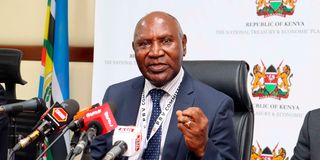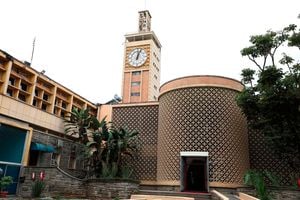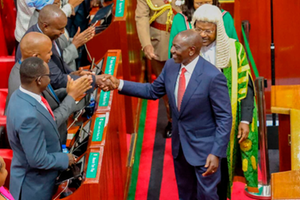
Pending Bills Verification Committee Chair Edward Ouko addressing journalists on the progress made by his team on January 31, 2024.
MPs are questioning whether the pending bills verification committee is a scheme by the government to delay the payment to suppliers and contractors as it emerged that the pending bills have hit Sh700 billion.
This came as the Public Accounts Committee (PAC) of the National Assembly summoned the management of the pending bills verification committee headed by former Auditor-General Edward Ouko to explain why the verification of the bills was taking unnecessarily long.
But even as PAC chaired by Butere MP Tindi Mwale expects to grill Mr Ouko, some members of PAC revealed how some of the suppliers and contractors owed by the government have been frustrated to death chasing what is rightfully owed to them while others are bedridden.
“This thing called verification of pending bills, what really is it?” posed Funyula MP Dr Wilberforce Oundo, a PAC member, adding, “I know of a person from my constituency who went to grave because of the frustrations he encountered chasing what the government owed him.”
It is at this moment that Mr Mwale demanded that the pending bills verification committee appears before PAC to explain why the verification is necessary and whether it should take such a long time, in the process, hurting legitimate suppliers and contractors.
“We have to invite the pending bills verification committee to hear from them on this matter. Legitimate individuals who have done business with the government and delivered shall not continue to suffer the ignominy of being auctioned while some government agencies responsible take their sweet time,” said Mr Mwale.
Billions of rejected claims
The PAC chairman gave the directions as it emerged that the pending bills committee rejected Sh268 billion of the Sh664 billion payment claims as of March this year upon verification.
This is the report of the pending bills committee submitted to the Liaison Committee of the National Assembly during the consideration of the 2025 Medium Term Debt Management Strategy (MTDMS) paper.
The rejection was on account that some claims lacked the required documentation.

The National Assembly during a sitting.
The Ouko-led committee has the mandate to scrutinize and analyze the existing national government pending bills that have accumulated for years and make recommendations to the government on settlement.
The committee is also mandated to establish clearly defined criteria for detailed examination of and analysis of such pending bills or claims with a view to determining the genuineness of each or otherwise.
Auditor warning
Auditor-General Nancy Gathungu, in her audit reports on the accounts of state agencies submitted to parliament, has warned that the failure to settle pending bills during the year in which they relate distorts the financial statements and adversely affects the budgetary provisions for the subsequent year.
“Pending bills could expose the project to the risk of incurring unnecessary interest and penalties in case of litigation,” the audit reports warn.

Auditor-General Nancy Gathungu.
The accumulation of pending bills is against the Public Finance Management (PFM) Act which states that before goods and services are procured or a contractor brought on board, the responsible procuring entity shall ensure that there is a budget.
Regulation 42 (1) (a) of the Public Finance Management (National Government) Regulations 2015 states that debt service payments “shall be a first charge on the Consolidated Fund and the accounting officer shall ensure this is done to the extent possible that the government does not default on debt obligations.”
Some State agencies that receive exchequer funding have claimed that some of the pending bills have been caused by challenges in exchequer releases and delayed submission of invoices by the service providers. However, the Auditor-General warns that delays in clearing the bills expose the government to nugatory expenditures in the form of interest accrued and penalties, due to delays in payment of the bills.
Burdened ministries
Documents submitted in parliament by the Auditor-General show that, for instance, during the 2022/23 financial year, the Ministry of Health at Sh40.22 billion is among the State agencies with the highest amount in pending bills
The documents also show that the National Police Service (NPS) had pending bills of Sh5.5 billion for the 2022/23 financial year.
“The bills were not settled during the period under review but were instead carried forward to the 2023/24 financial year. No satisfactory explanation was provided for non-payment of pending bills during the year they were incurred,” the audit reports for the year under review reveal.
Also Read: Senators want Sh3.4bn more from road fund
During the same period, the Ministry of Defense had pending bills of Sh9.8 billion owed to suppliers of goods and services which were not paid in the year under review but were carried forward to the 2023/24 financial year.
The pending bills verification committee is required to make recommendations to the National Treasury on the necessary actions to be taken for satisfactory disposal or settlement of identified pending bills or claims.
The committee is also required to identify any cases where there may have been corrupt, fraudulent and false claims against the government and make appropriate recommendations to the relevant state agencies.
It is further mandated to develop reforms or measures to ensure future accumulation of pending bills is avoided and perform any other function incidental to the foregoing.












